|
|
|
Sort Order |
|
|
|
Items / Page
|
|
|
|
|
|
|
| Srl | Item |
| 1 |
ID:
157483
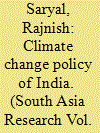

|
|
|
|
|
| Summary/Abstract |
Since the 1970s, and especially following the 1992 Rio Earth Summit, climate change has become an area of high politics, engaging the whole world at the international and diplomatic level. What matters, though, is how this translates into tangible policies at national and local levels, and how these different scales interact. Highlighting India’s unique position in international climate negotiations, this article first scrutinises various official statements and documents of the Government of India (GOI) on climate change and puts them into an analytical framework that demonstrates continuities, but also significant recent shifts. Investigating the reasons for such modifying trends and examining their consequences, the article then suggests that partly owing to recent changes in global and (geo)political contexts, but also due to an Indian re-thinking of responsibility for addressing global climate change, there is a significant new development. This seems to augur a South Asian ‘silent revolution’ in green technologies, a prudent, economically and ecologically beneficial step, not only for India but possibly a sustainable global model.
|
|
|
|
|
|
|
|
|
|
|
|
|
|
|
|
| 2 |
ID:
157485
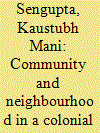

|
|
|
|
|
| Summary/Abstract |
This article on the history of neighbourhoods (para) of colonial Calcutta considers the processes through which this peculiar spatial unit emerged in the colonial city, where community identities were fostered as well as contested. Seen as a place, a secured, stable location which helped in forming the community in an alien atmosphere, the para was a liminal space, neither a purely affective unit nor an administrative category, and neither a purely public or private domain. Borrowing liberally from each register to generate a unique spatial experience, paras were at the same time deeply exclusionary and also starkly patriarchal zones. The article brings forth these various strands in the history of the neighbourhood to enrich the understanding of colonial urbanism, Bengali society and culture.
|
|
|
|
|
|
|
|
|
|
|
|
|
|
|
|
| 3 |
ID:
157487
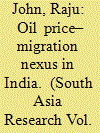

|
|
|
|
|
| Summary/Abstract |
Given that India is globally the top recipient of migrant remittances and over 90 per cent of Indian worker emigration is to oil-producing nations in the Gulf region, such significant economic relations between the two regions raise concerns that decreasing oil prices may lead to serious negative economic impacts. This article attempts to understand the association between emigration and oil price, assuming that fluctuations in oil price will adversely affect the economic prosperity of oil-producing nations and thus the emigration prospects of a significant section of global migrant workers, including millions of South Asians. Examining the association between changes in oil price and emigration from India more specifically aims to ascertain whether there is a direct correlation, so that reasonable precautions may be made regarding the impact of oil price changes on South Asian worker migrant flows.
|
|
|
|
|
|
|
|
|
|
|
|
|
|
|
|
| 4 |
ID:
157486
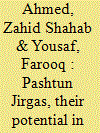

|
|
|
|
|
| Summary/Abstract |
Relations between Pakistan and Afghanistan have mostly been hostile since 1947. The animosity has grown in complexity from various territorial disputes to frequent allegations of cross-border terrorism in the post-9/11 era. This article first makes a case for involving Jirgas, a traditional dispute resolution mechanism among Pashtuns, for improving peace dialogues between both countries. It presents evidence of the traditional acceptability of Jirgas by Pashtuns on both sides of the border and assesses previous official bilateral attempts of using Jirgas. It then proceeds to propose some new policy recommendations focused on national reconstruction of Afghanistan, which include involvement of the Taliban as an important local stakeholder. The dual key argument then becomes, first, that since Jirgas have long-standing local legitimacy and acceptability both in Afghanistan and Pakistan, using the strength of their social recognition would allow higher-level bilateral negotiations between the neighbours, enhancing the effectiveness of new and locally more credible forms of multi-track diplomacy. Second, reinvigorating the Jirga system would allow the Afghan people themselves to engage in fuller multi-dimensional debates on sustainable modalities for their own future, on terms to be set by them, not outsiders.
|
|
|
|
|
|
|
|
|
|
|
|
|
|
|
|
| 5 |
ID:
157484
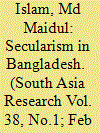

|
|
|
|
|
| Summary/Abstract |
Ever since Bangladesh became independent in 1971 and proclaimed secularism among its four-pronged constitutional core objectives, the world’s third largest Muslim country has been struggling with this concept and its practical manifestations. The temptation of misusing religion in heavily politicised contexts and contestations over social, political and economic interests and development remains ever-present. The violently antagonistic relations between secular and non-secular forces, this article offers some fresh insights into the dynamics of relationships between religion, politics and Islamist militancy in contemporary Bangladesh through discourse analysis. While the hegemonic nature of the deeply contested state apparatus has dominated the headlines, the space for secularism as a sustainable common platform for all people of Bangladesh has appeared to be shrinking. However, this article shows that not all is lost, provided new balances can be found.
|
|
|
|
|
|
|
|
|
|
|
|
|
|
|
|
|
|
|
|
|